‘Gotta Coach Somebody’

By Pete Thamel
TAMPA — As dawn rises on a quiet October Friday, Greg Schiano stands over a pile of sizzling bacon laid out on the George Foreman Grill in his kitchen. Egg beaters, skim milk and sour cream line the counter, and Schiano mixes them into an oversized white ceramic bowl. With a spring in his step, he opens a cabinet to unveil the secret ingredient for his everything-in-the-fridge concoction he calls ranchos huevos. “Taco mix, a little known trick,” he beams. “Gives it a little pop.”
The last time the football world saw Greg Schiano, he was on the sideline of the Tampa Bay Buccaneers, finishing a season in which everything that could have gone wrong did. His quarterback, Josh Freeman, went rogue. A mysterious MRSA infection popped up in the locker room. “Fire Schiano” billboards appeared around town as the Bucs started 0-8, and former players cast him as an autocrat in the media. Humbled by his firing and blunt about his mistakes, the 48-year-old Schiano has used his first year away from full-time coaching in a quarter century to reinvent his coaching philosophy and undergo a frank assessment of himself. It’s a task he is attacking through a series of small jobs, informational visits around the country and unsparing self-evaluation. “I didn’t know what I didn’t know, which is dangerous,” he says of his entrance into the NFL.
You might already be familiar with one of his jobs, the one that has kept Schiano in the public eye: a weekly X’s and O’s segment on NFL Network.
But his first job, every morning, is to cook breakfast for his wife, Christy, and four kids, ages 11 to 17. These days his toughest critic is his youngest, Katie, who on a recent morning takes a crooked look at his breakfast concoction and heads to the pantry for a box of Fruity Pebbles. “It just doesn’t look good,” she says, dumping her cereal in the bowl. Fumble, a nose-tackle sized white lab, lingers for table scraps after the kids head off to school. Schiano jokes that he tried, unsuccessfully, to rename him Ball Security. “It’s like a stockbroker with a dog named Crash,” he says.
Schiano’s main job has been preparing for his next interview. He’s traveled from Columbus to Tuscaloosa to Foxboro refining how he’d run a college program or NFL franchise.
On afternoons he works a coaching job. He is a volunteer at Berkeley Prep in Tampa, where his three sons—Joey, a 17-year-old senior, and freshmen twins Matt and John (15)—play. Schiano’s title is “assistant defensive line coach,” but he stays off the sideline for games so he doesn’t draw any attention away from the players and coaches.
Schiano’s main job, however, has been preparing for his next interview. He has traveled everywhere from Columbus to Tuscaloosa to Foxboro, refining how he’d run a college program or NFL franchise. He says only about 15 percent of what he has looked at is related to X’s and O’s, which includes weekly pre-dawn film sessions with Jon Gruden. Instead, he is focused on organizational and macro topics such as, “Can I be just as demanding of people, but make their quality of life better?”
Schiano hopes to return to football in 2015, as a collegiate or NFL head coach. In the next two months, an athletic director or NFL owner is going to have to make a decision about him. Is he the hard-nosed disciplinarian who resuscitated Rutgers from a century of wretched football, enjoying so much success that he turned down head coaching jobs at Miami and Michigan? (He also declined the chance to talk to Tennessee when Derek Dooley took the Vols job in 2010.) Or is he the NFL coach who earned raves for instilling discipline during his debut 7-9 season before free-falling to 4-12 and finding himself unemployed?
One concept Schiano has become enamored with is Urban Meyer’s “juice,” a catchall term for energy and motivation. Until he has a team to try it on, Schiano has been bringing “juice” to breakfast every morning. Christy uses the word “chipper” to describe her husband’s morning demeanor. He’s known to sing, Put it away/Put it away/Put it away now, to the tune of the Red Hot Chili Peppers. It’s a nod to his cleanup-as-you-go kitchen philosophy, and when the kids’ morning-glaze glares beg him to stop, he sings louder. Schiano flashes that familiar gap-toothed smile, shrugs his shoulders and sums up his current predicament and future goal: “Gotta coach somebody.”
* * *
Bob Croslin for Sports Illustrated/The MMQB

Schiano’s daily commute—about 20 yards from the kitchen to his office—commences when the final breakfast cleanup ends at 7:39 a.m. He walks through his six-bedroom, waterfront home to a spacious office decorated with multiple coach of the year awards, a Bruce Springsteen poster from one of his Giants Stadium hitches, and his prized coaching keepsake—a framed tie that Sue Paterno gave him from Joe Paterno’s closet after the Penn State coach’s death in 2012. There are framed group-and-grin pictures with Bobby Bowden and Paterno, another of Meyer and Mack Brown from Nike coaching junkets. Schiano admits he overlooked a lot of things, life things, when he was sucked into the coaching vortex of 16-hour days. So this year he hired an accountant, visited with a financial advisor and got his health checked out.
He has also caught up on family life. He discovered Netflix with Christy—Friday Night Lights, Prison Break and Breaking Bad. They hadn’t consistently watched a network show together since Beverley Hills 90210. “It took him a while,” says Christy, “to stop working from the time he woke up until midnight.” He also learned how to use the dishwasher and navigate office life without a phalanx of support and video staff to cater to him. “This whole PDF thing?” Schiano exclaims. “Amazing!”
Schiano spends time refining such elements as red zone defensive philosophy and teaching. His notes don’t contain specific plays but rather ideas and ideals that he calls a “football curriculum.”
Clad in his customary creased khaki coaching shorts—he owns more than 30 pairs—Schiano settles behind his large wooden desk for his daily routine. He keeps a giant server under his desk that holds all of the “ODK” (offense, defense and kicking game) since the middle of his tenure at Rutgers through his time in Tampa.
Schiano branched off an old-school coaching tree. He worked under Paterno at Penn State, Dave Wannstedt with the Chicago Bears and Butch Davis at Miami before getting the Rutgers head job as a 34-year-old in 2000. But in his off year he’s found inspiration in the career narrative of a new-age coach: Pete Carroll. He read Carroll’s book, Win Forever, and spoke to a lot of people who have spent time around him in Seattle. Carroll was twice fired as an NFL head coach and wrote extensively in his book about refining his coaching philosophy during a year away from the game in 1999, after he had lost the head job in New England. Carroll was 48 then, the same age as Schiano.
Carroll stresses positive energy and blares music in practice and meeting rooms. Constant motivation and stimulation were staples of Meyer’s Ohio State program when Schiano visited there this summer, and those positive vibes prompted Schiano to re-think his motivational techniques. At Rutgers, he recalls getting his team fired up for a game with Navy by saying they didn’t respect Rutgers’ mantra of chopping wood. But Schiano realizes that repeatedly decreeing “Nobody mocks the chop!” isn’t the most sustainable model. Schiano’s time off has helped him realize that modern athletes need constant stimulation. He points to his kids watching Vines on short car rides and Chip Kelly’s philosophy of not having meetings last longer than a half-hour. He plans to bring “juice,” blaring music and constant motivation to his next stop. “You have to be able to live with that organized chaos to keep the energy level up there,” he says. “I am willing to do that.”
The MMQB on Football Lifers
Greg Bedard on long-time assistant coach Ken Flajole, out of the league for the first time in 37 years. FULL STORY
Peter King profiles reclusive Packers GM Ted Thompson. FULL STORY
Greg Bishop on the u201cretiredu201d Mike Holmgren. FULL STORY
Peter King on Cardinals coach Bruce Arians, the profane perfectionist. FULL STORY
Schiano also spent a week behind the scenes with Bill Belichick, a mentor and close friend. Schiano’s takeaway from New England was the culture Belichick created, one in which everyone sees football from the “Patriot viewpoint.” Schiano spends time refining such elements as red zone defensive philosophy and teaching. His notes don’t contain specific plays like “Y24 Zebra” but rather ideas and ideals that he calls a “football curriculum.”
“Too many times I’ve heard assistant coaches say, ‘This kid isn’t football smart,’ ” Schiano says. “As coaches, we teach them plays, but do we take the time to teach them the game, situational football?”
Schiano visited Alabama, where his friend and former assistant Mario Cristobal is the offensive line coach and assistant head coach. He came away impressed with the synchronization of Nick Saban’s program, not to mention the facilities in Tuscaloosa. Schiano found himself sneaking cell phone pictures of lockers, noting their size as fodder for his next stop. When Alabama players left the practice field, they all had customized smoothies waiting for them, high-calorie for guys trying to gain weight and low-calorie for those needing to drop pounds. “Everything is systematized,” he says, “from nutrition to academic support.”
There are smaller things Schiano picked up along the way. He loved how Princeton’s defensive meeting rooms all had footballs attached to springs and nailed to the walls. When defensive players walk into the room, they whack the ball as a way to establish a culture of forcing turnovers. “Definitely stealing that,” Schiano says, proudly showing a picture of the set-up on his phone. Schiano liked some of the corporate approaches Al Golden used at Miami, specifically using staff e-mails for things like distributing cut-ups.
Schiano visited Arkansas, where a former assistant, Robb Smith, is defensive coordinator. He admired the way Bret Bielema’s energy rippled through the program and left Fayetteville with a macro takeaway. “I’ve known Bret for a lot of years, and just the way he approaches everything, he enjoys himself,” Schiano says. “That’s harder for me to do. I’m not that freewheeling, but I can appreciate that in a guy. I need to do that more.”
* * *
Schiano with Carroll before a game in 2013. (Elaine Thompson/AP)

At the end of Schiano’s first season in Tampa Bay, he gave all the players surveys. They could fill them out anonymously or attach their name to them. The blunt feedback prompted Schiano to change radically from his first season to the next. Schiano arrived in Tampa under direction from ownership to instill discipline in a franchise that had become too loose under Raheem Morris. In his quest to do that, Schiano admits he didn’t make some of the necessary adjustments needed when coaching professional athletes as opposed to college kids.
In his first year, Schiano began every meeting with a support staff member taking attendance of every player by calling out his number. One of the players wrote on his survey: “I felt like I was going from cell block to cell block.” Another player chafed at the mandatory meals—a college staple—saying he’d rather have breakfast with his family. So before his second season, Schiano ditched the roll call and made pregame meal the only mandatory one.
But Schiano doesn’t feel that the reality of the 2013 season outlasted the reputation from 2012. “You know the saying, You get the reputation for being an early riser, you can sleep till noon,” he says. “Well, it goes the other way too. If you get a reputation for being a jerk, no matter how well you treat the players…”
Schiano set up a strict program for the rookies in that second season but gave the veteran players much more freedom. If he ends up returning to college, he’ll give established upperclassmen more leeway. “I think you have to do that a little with juniors and seniors,” he says. “And I did. But probably not as much as I will when I go back. When they’re with you for three years, they’re grown up. They get it.”
If Schiano returns to college, one of the most drastic adjustments he’ll make is how he treats NFL scouts and personnel. Rutgers developed the worst reputation of any college program in how it treated NFL scouts evaluating its players, something Schiano looks back on and regrets. There were plenty of general managers around the NFL quietly chuckling when Schiano’s tenure in Tampa melted down, as he was infamous for limiting access and the amount of practice that scouts could watch at Rutgers. Schiano was mimicking the model of Paterno, who was notoriously difficult with NFL scouts. Again, by the time Schiano adjusted late in his tenure, it was too late to outdistance the reputation. “I didn’t see how that would help Rutgers, which was dumb,” Schiano says. “We were putting so many kids in the league even though it wasn’t a good visit. We could’ve put more in, probably.”
Schiano realized that his greatest strength—relentless tunnel vision—became something of a weakness when it came to dealing with coaches, staff and the media. “I was focused on one thing,” he says, “and that was our team.”
It’s nearly unanimous in NFL scouting circles that Alabama is the best place for scouts to visit, as Saban has an intricate set-up that includes catered meals to make scouts feel welcome. This isn’t an accident; Saban did two stints in the NFL. Schiano says he’s more in tune to a scout’s thankless grind, and he plans to flip his reputation through better access to his team and himself. “It wasn’t disrespect,” he says. “It was just ambivalence. I didn’t care. I was focused on one thing, and that was our team. I didn’t have aspirations to go the NFL, so it wasn’t like I was going to kiss your ass to hopefully get to the league someday. All I cared about was turning Rutgers around.”
Schiano did just that, reaching six bowl games at a place that only went to one in its entire history. He went 56-33 his final seven years, a record that could go a long way toward convincing athletic directors he can mirror the career paths of Carroll, Saban and South Carolina’s Steve Spurrier, all of whom thrived in college programs after struggles in the NFL. The knock on Schiano’s tenure at Rutgers is that he never won an outright Big East title, something Schiano says makes him feel like “the Marv Levy of college football” for coming close so many times. Still, aside from Frank Beamer at Virginia Tech and Bill Snyder at Kansas State, few coaches have pulled off more impressive reputational overhauls than Schiano did for Rutgers in the 2000s.
He built Rutgers—through improvements on the field and in facilities overhauls—from a laughingstock into a program established enough to earn a coveted spot in the Big Ten. “Real success is leaving a legacy,” he says. “I think we built something, left a legacy and that can be sustained.”
Schiano has done plenty of work to ready himself for a return to college football. He keeps binders filled with DVDs of all his team meetings from the NFL, watching them to take notes on what he would add to his presentations, which he considers the equivalent of Football 101. He has also conducted a recruiting study to identify what geographic areas NFL draft picks hail from (short answer: Florida, California and Texas) to help refine his recruiting focus upon his return. He hosted former Kansas and Notre Dame recruiting coordinator Rob Ianello to catch up on what he has missed on the recruiting trail. He even joined Twitter under a secret account to keep up on news and better understand how recruits and media consume information. (Schiano insists he does not follow the Bucs, who are off to a 1-7 start this season, on Twitter or otherwise. Nor does he follow Freeman, who is out of football.)
But Schiano’s most important research came on himself, as he realized that his greatest strength at Rutgers—relentless tunnel vision—became something of a weakness when it came to dealing with coaches, staff and media. If he returns to college, Schiano hopes to find a better balance. “I think as a head coach, you have to hold people accountable,” he says. “But at the same time, how can I make it easier or better for them to get their job done?”
* * *
‘Gotta Coach Somebody’
Bob Croslin for Sports Illustrated/The MMQB
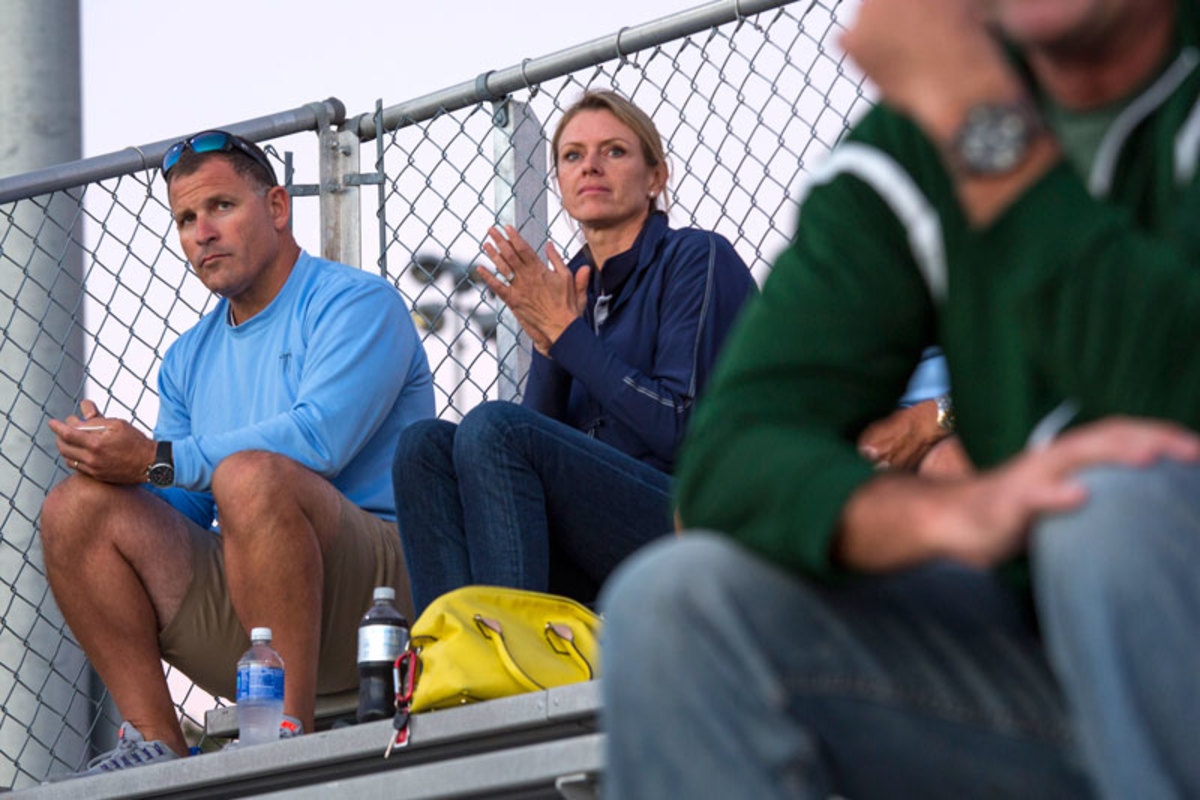
Bob Croslin for Sports Illustrated/The MMQB
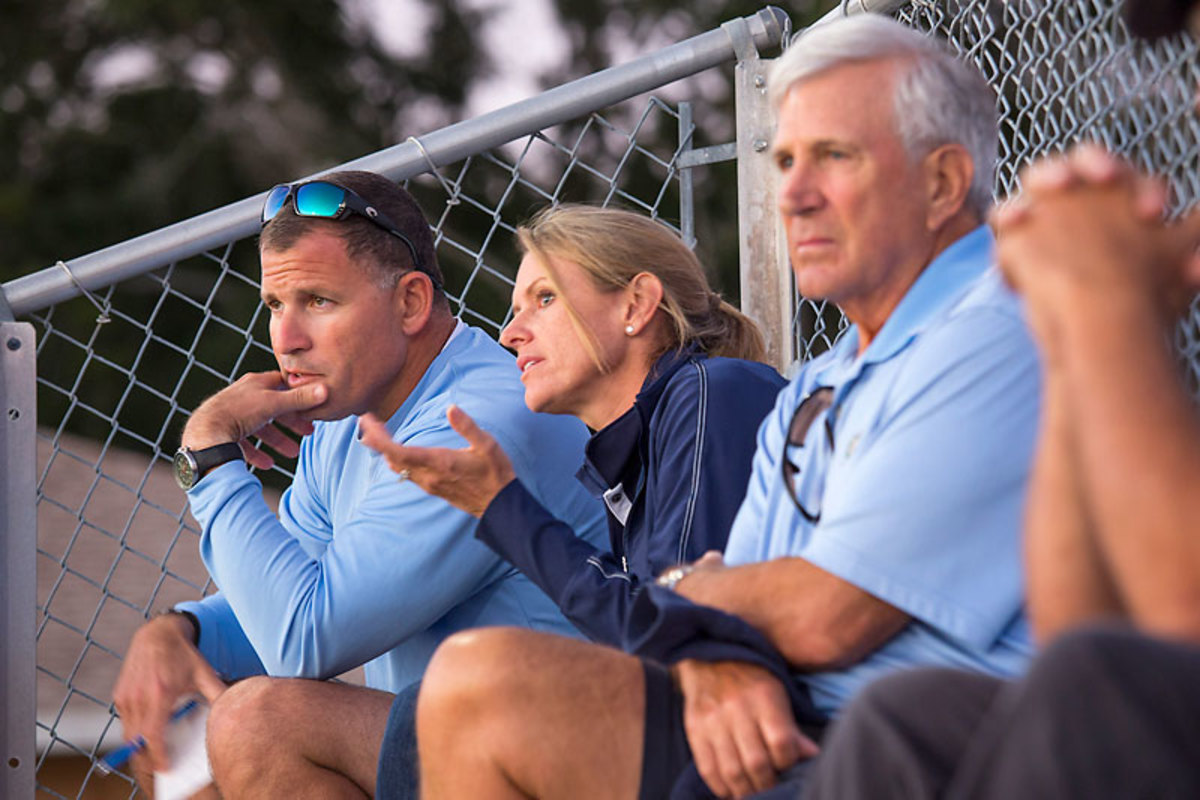
Bob Croslin for Sports Illustrated/The MMQB
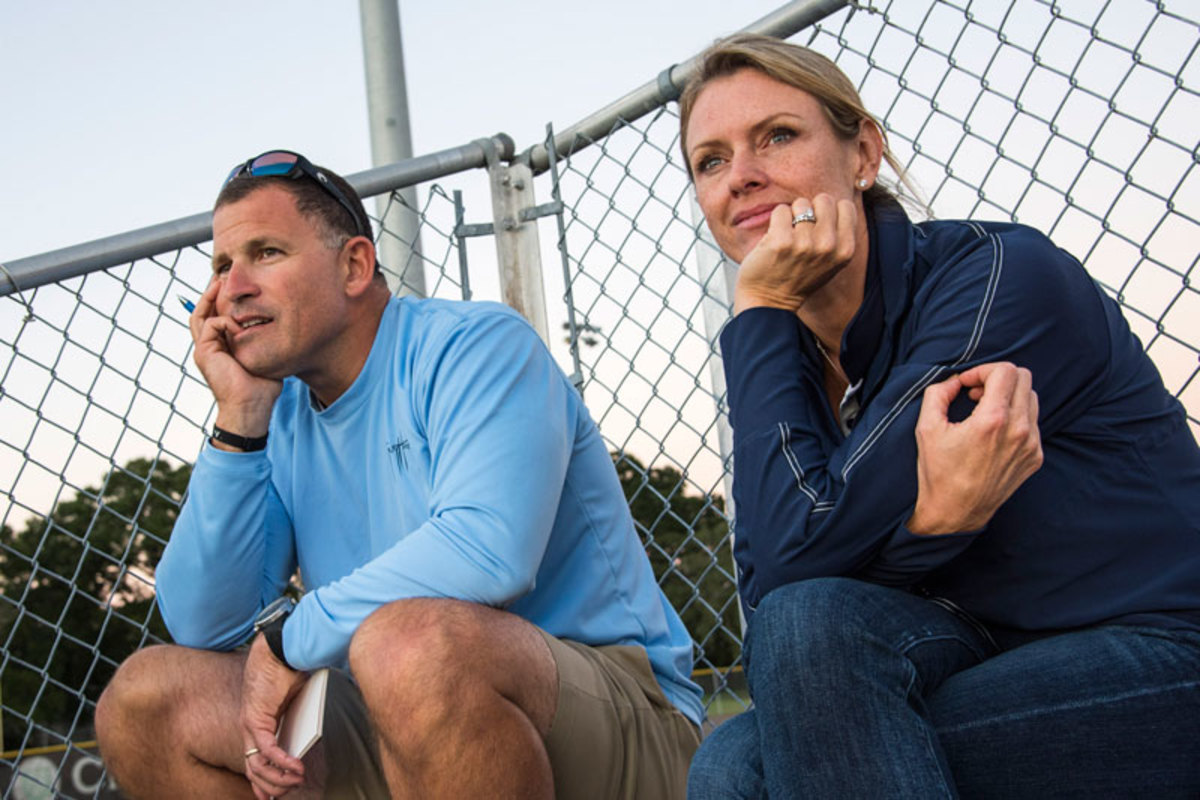
Bob Croslin for Sports Illustrated/The MMQB
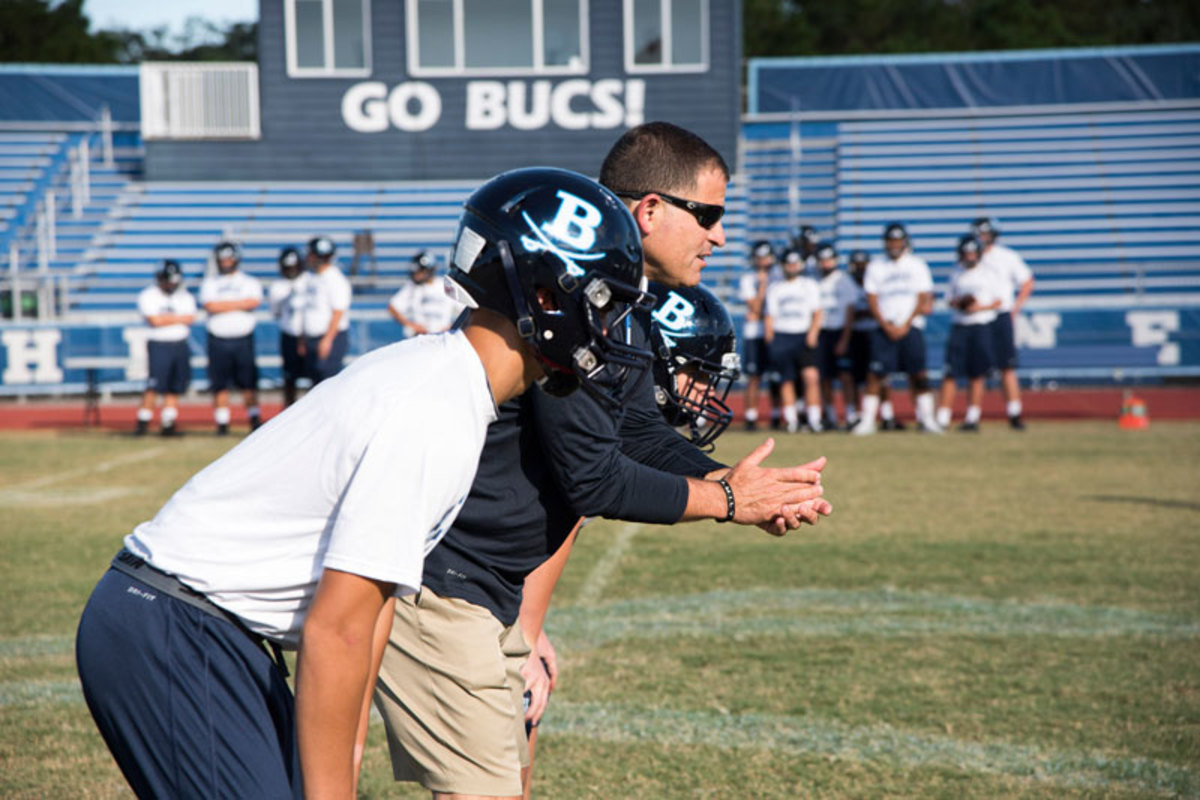
Bob Croslin for Sports Illustrated/The MMQB
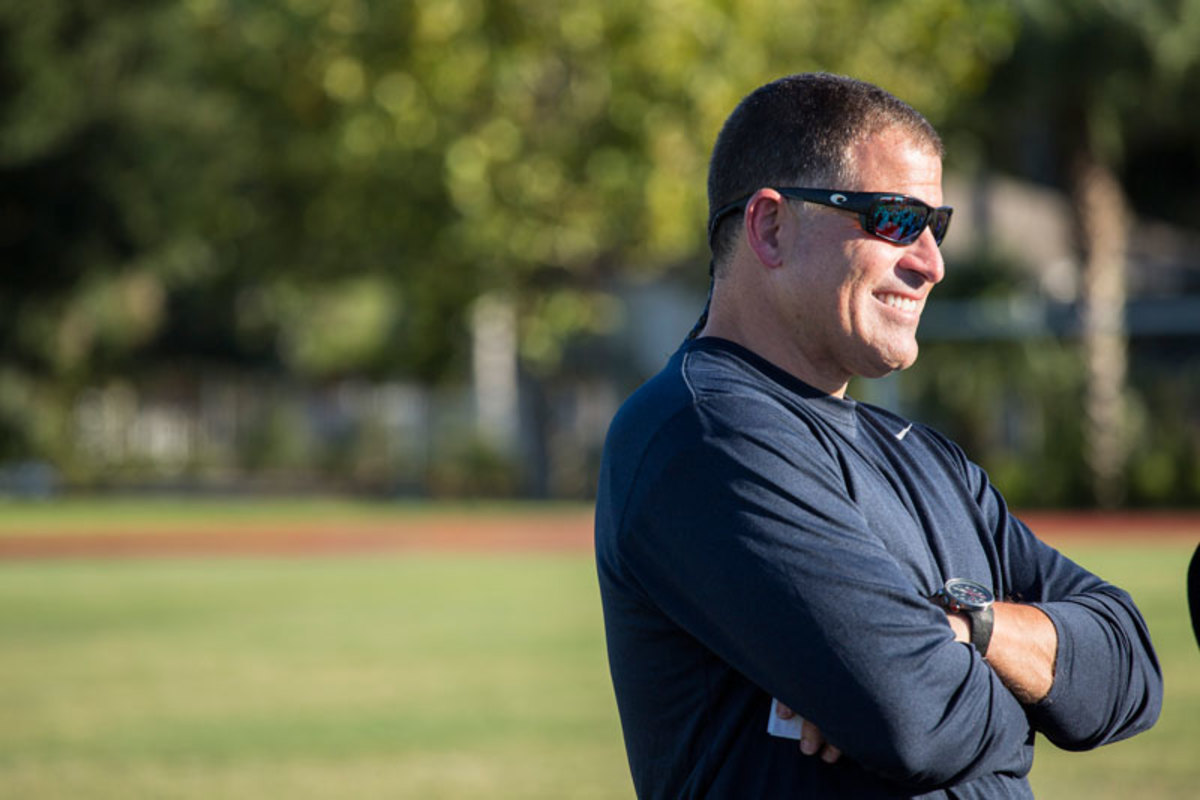
Bob Croslin for Sports Illustrated/The MMQB
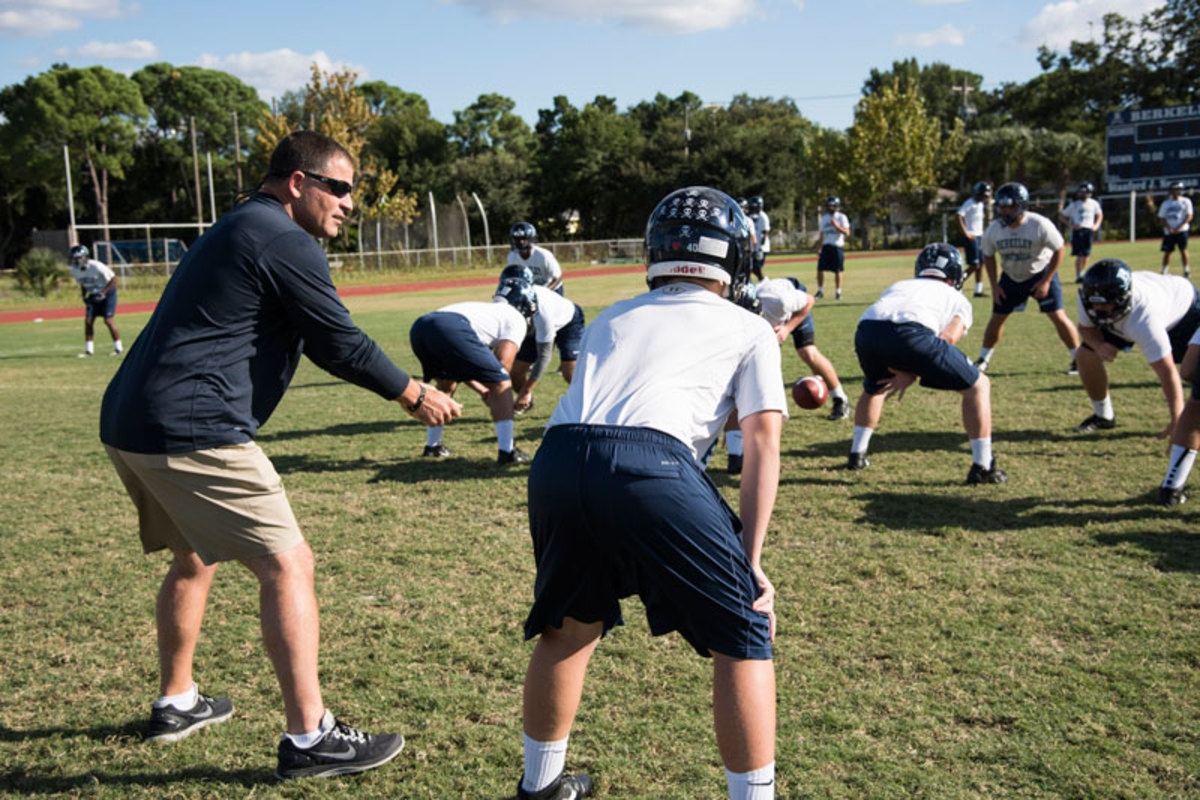
Bob Croslin for Sports Illustrated/The MMQB
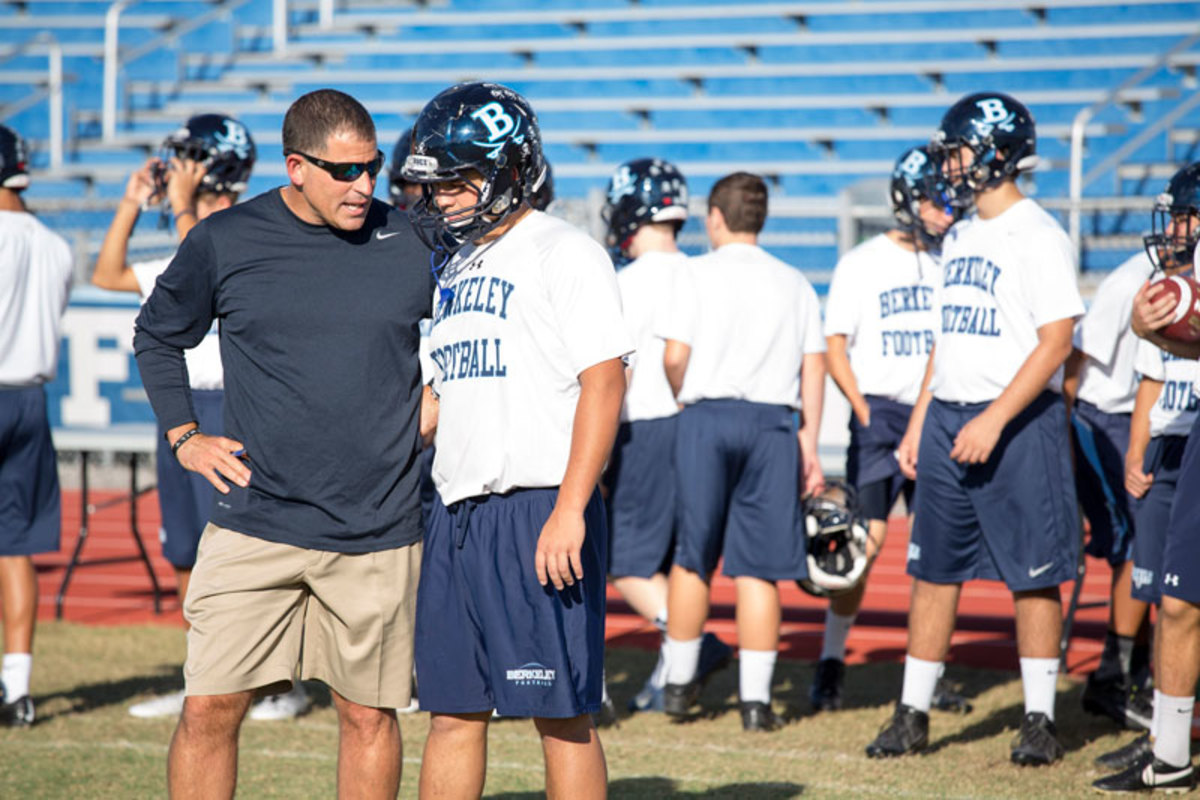
Bob Croslin for Sports Illustrated/The MMQB
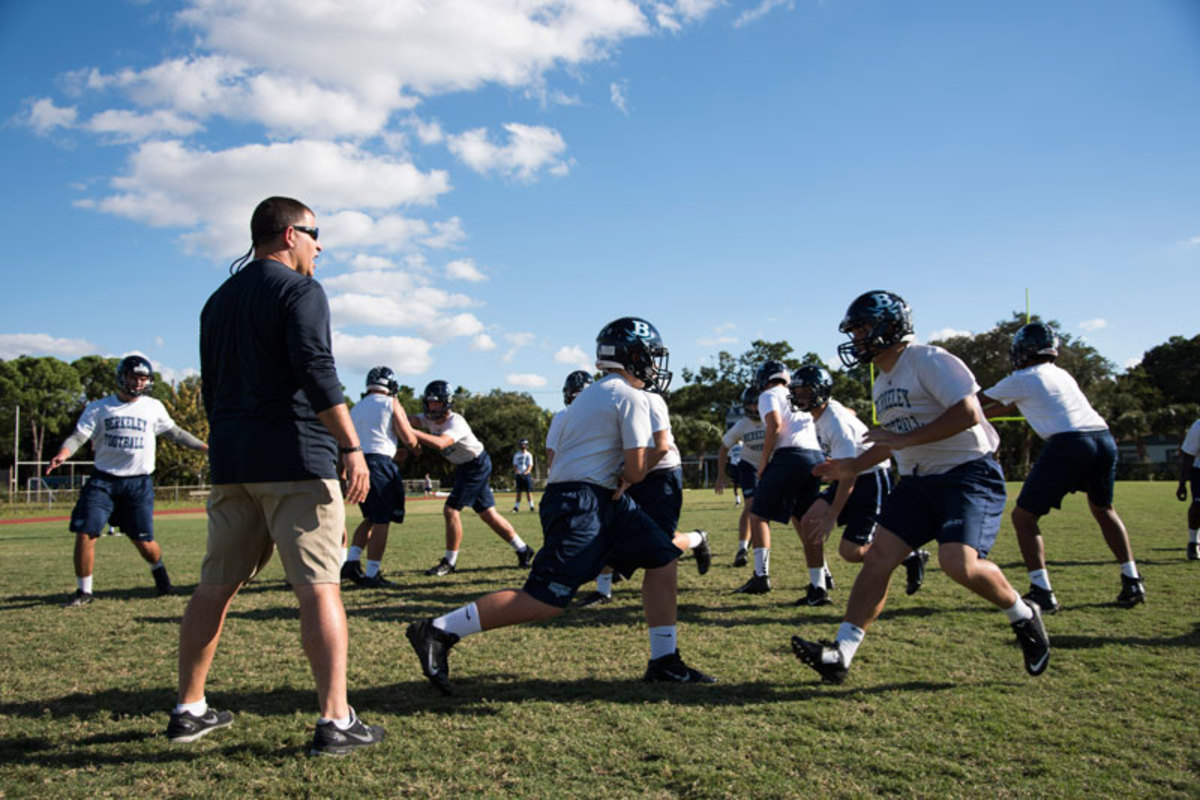
Bob Croslin for Sports Illustrated/The MMQB
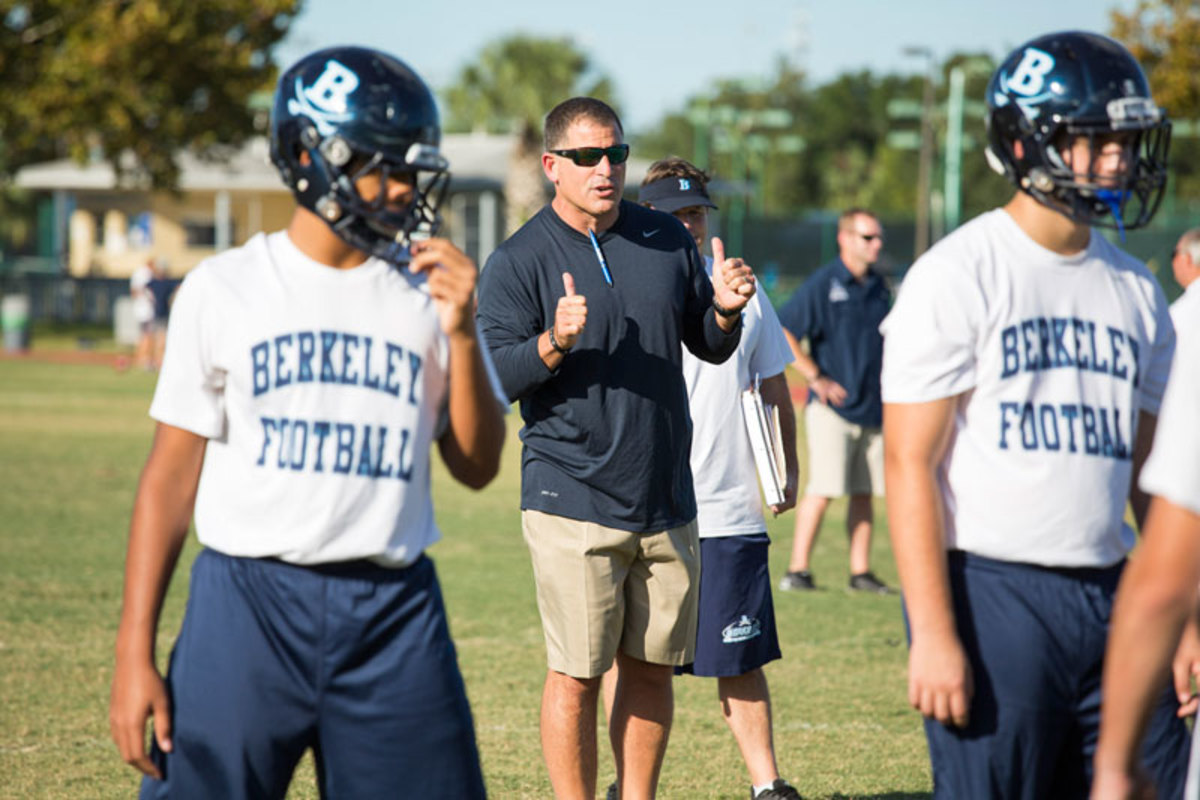
Bob Croslin for Sports Illustrated/The MMQB
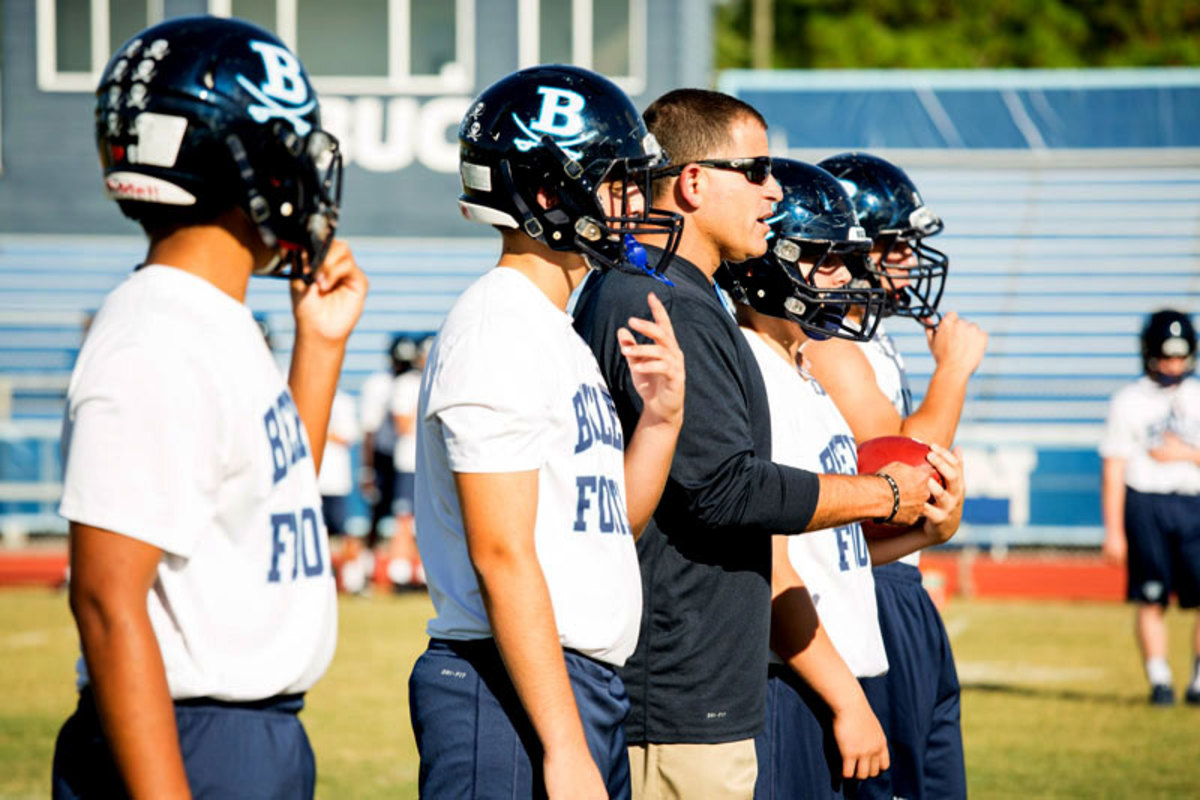
Bob Croslin for Sports Illustrated/The MMQB
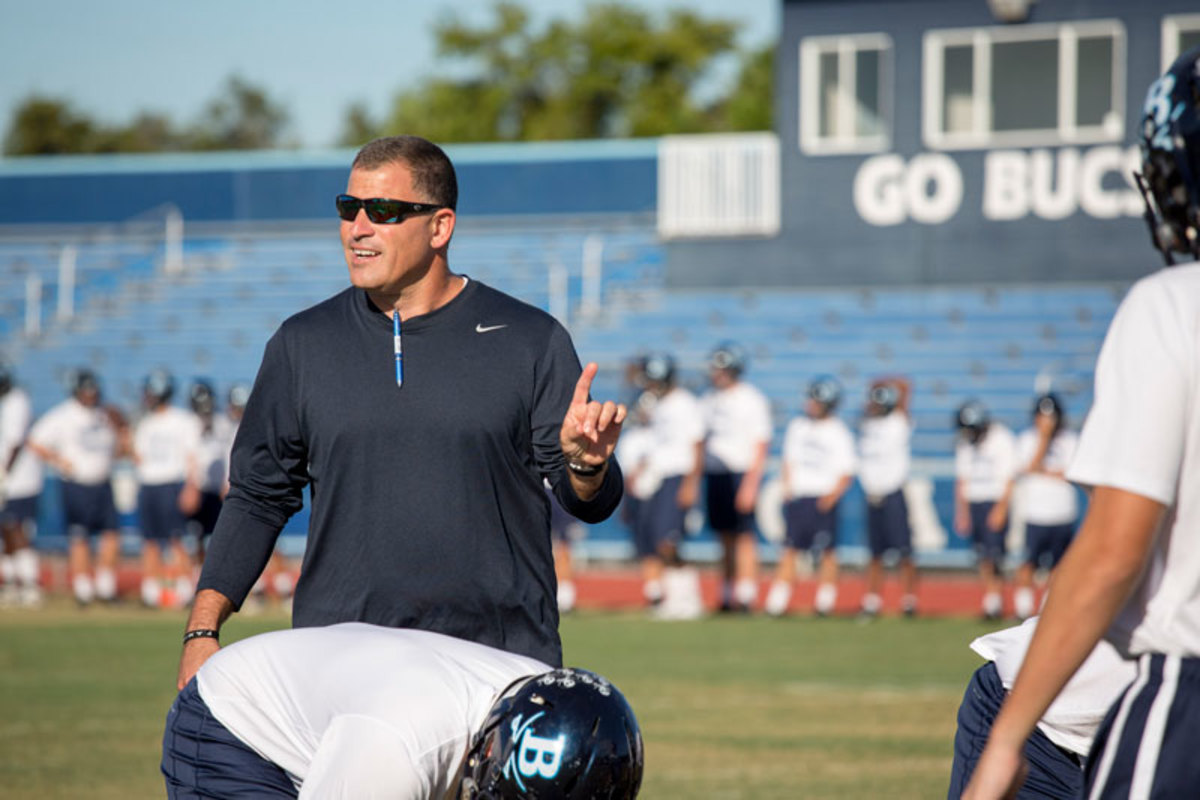
Bob Croslin for Sports Illustrated/The MMQB
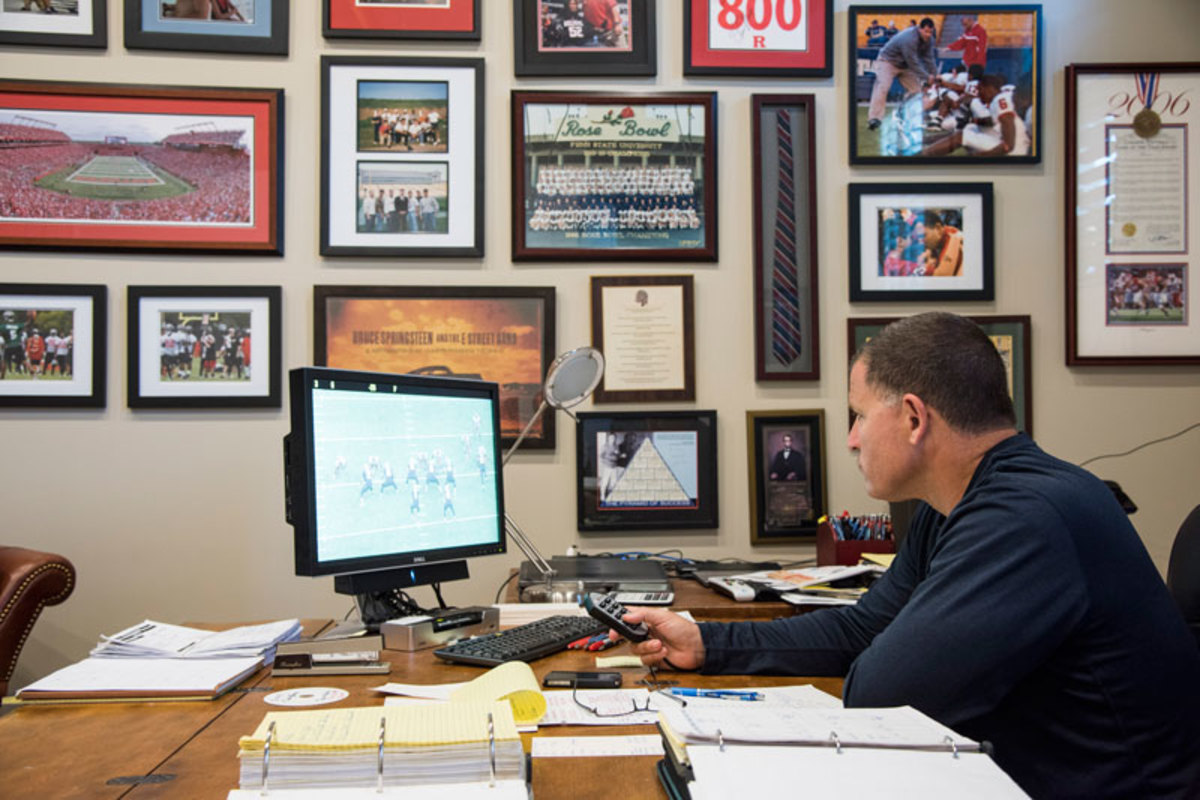
Bob Croslin for Sports Illustrated/The MMQB
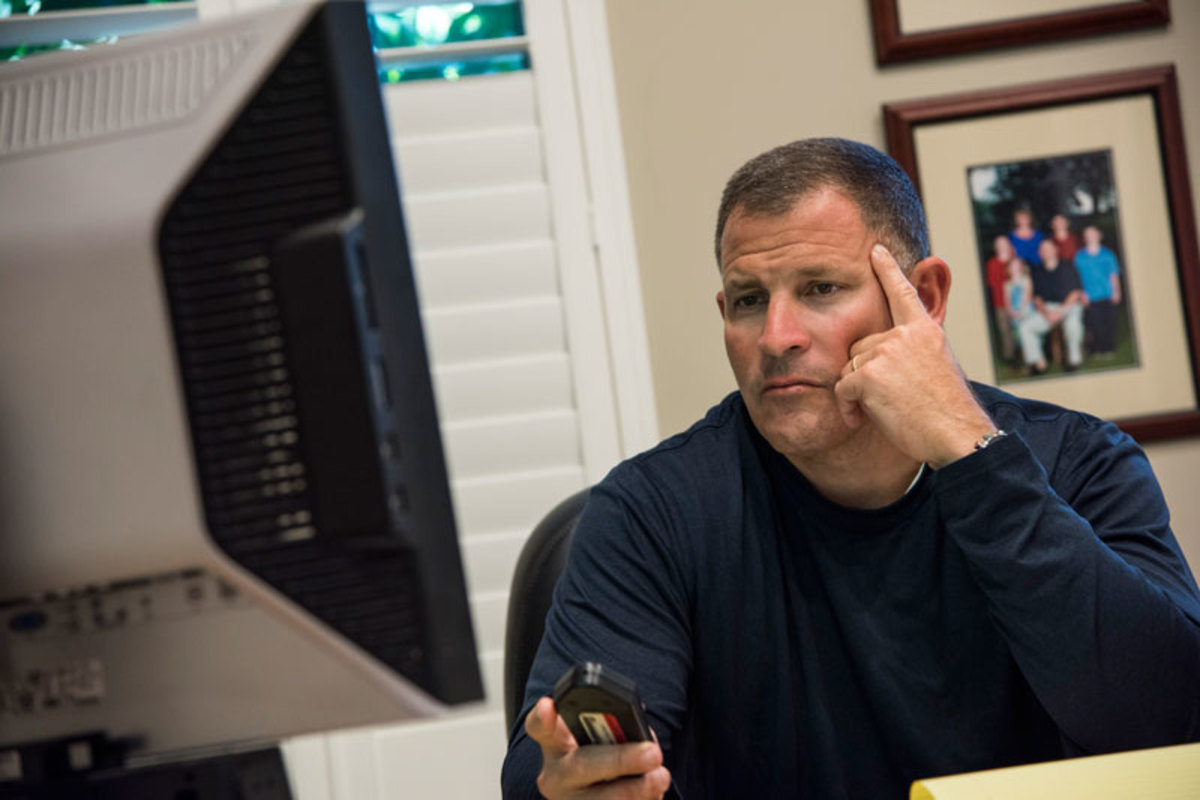
Bob Croslin for Sports Illustrated/The MMQB
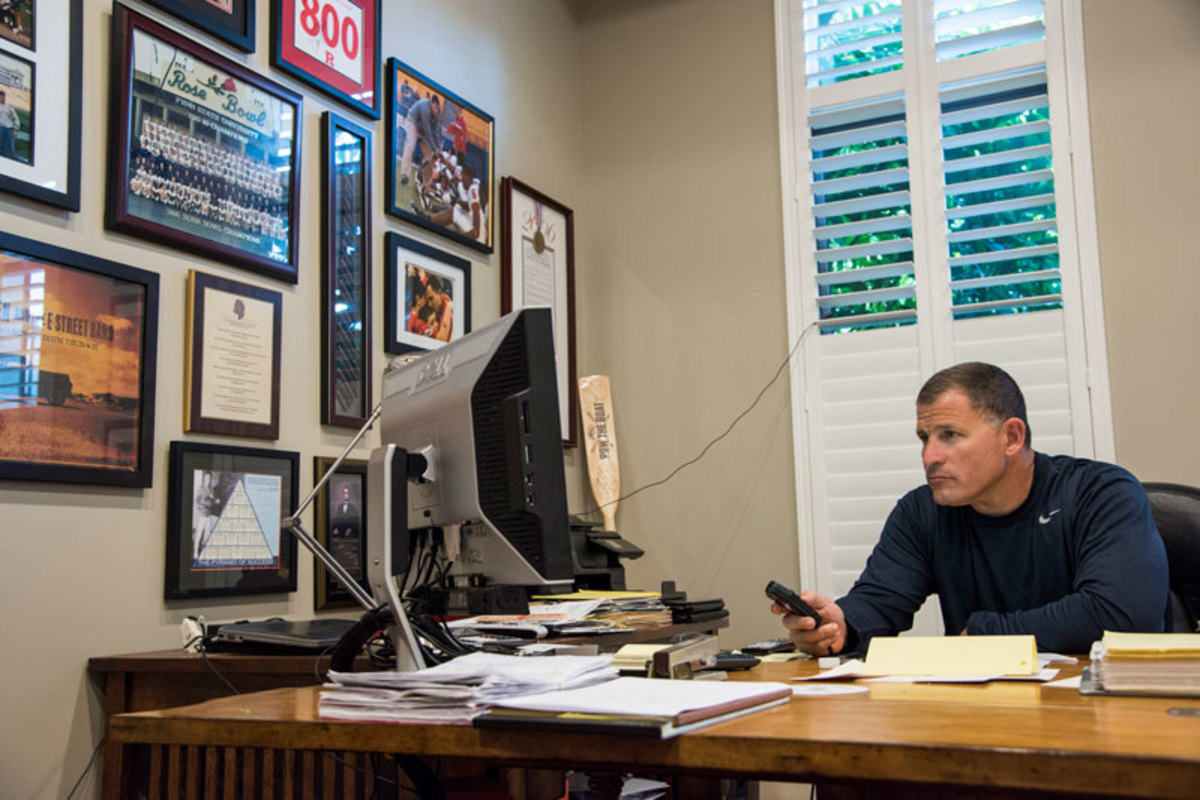
Bob Croslin for Sports Illustrated/The MMQB
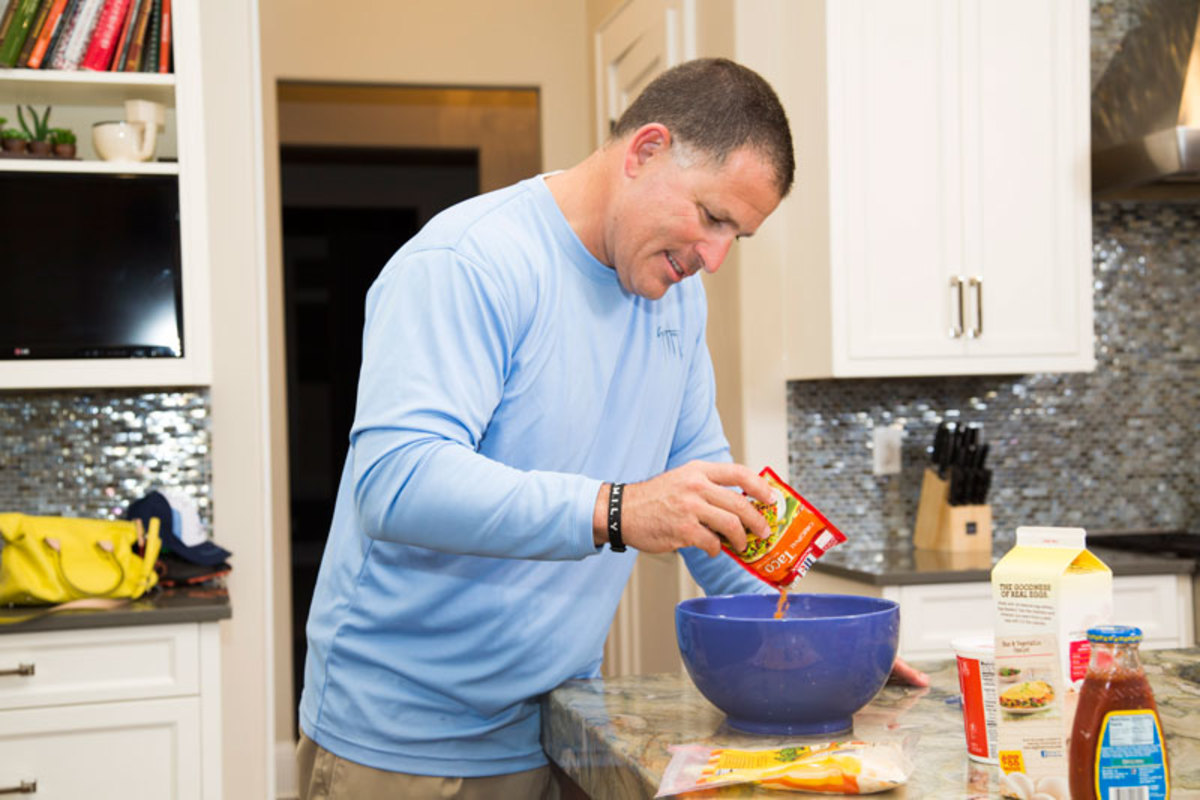
Bob Croslin for Sports Illustrated/The MMQB

Bob Croslin for Sports Illustrated/The MMQB

Bob Croslin for Sports Illustrated/The MMQB
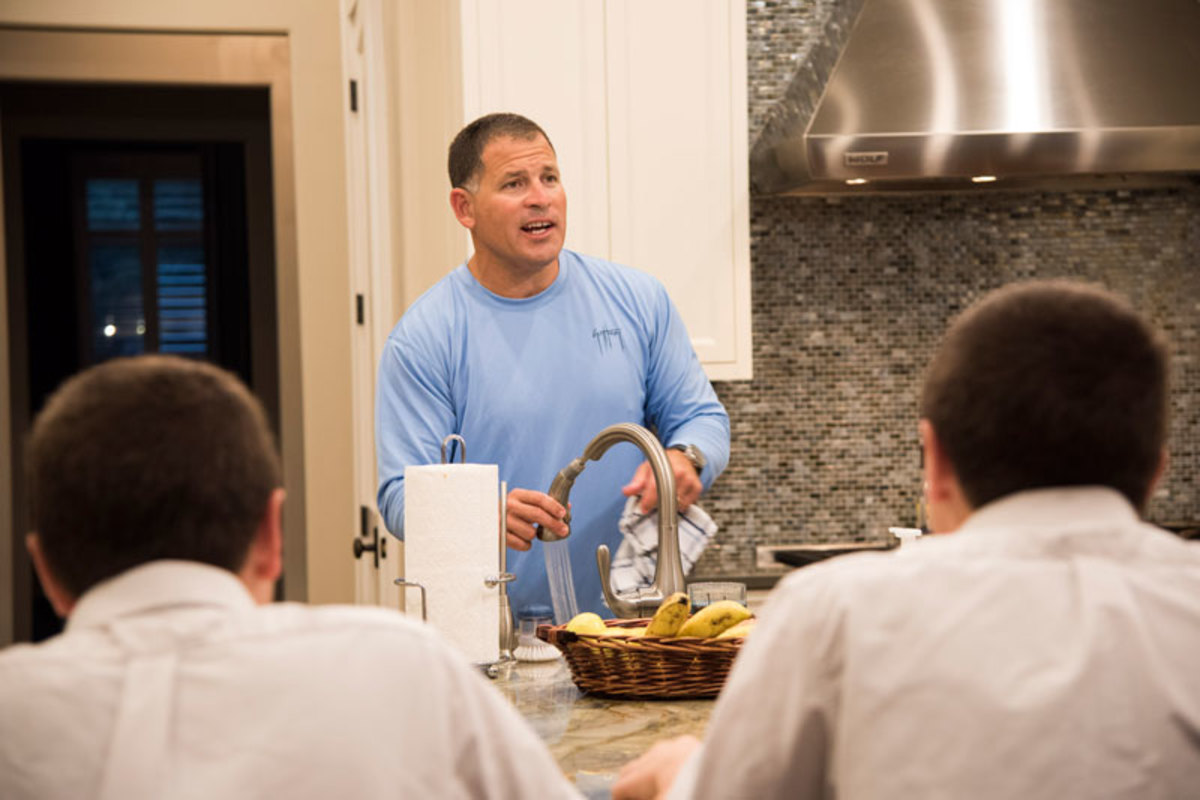
Bob Croslin for Sports Illustrated/The MMQB
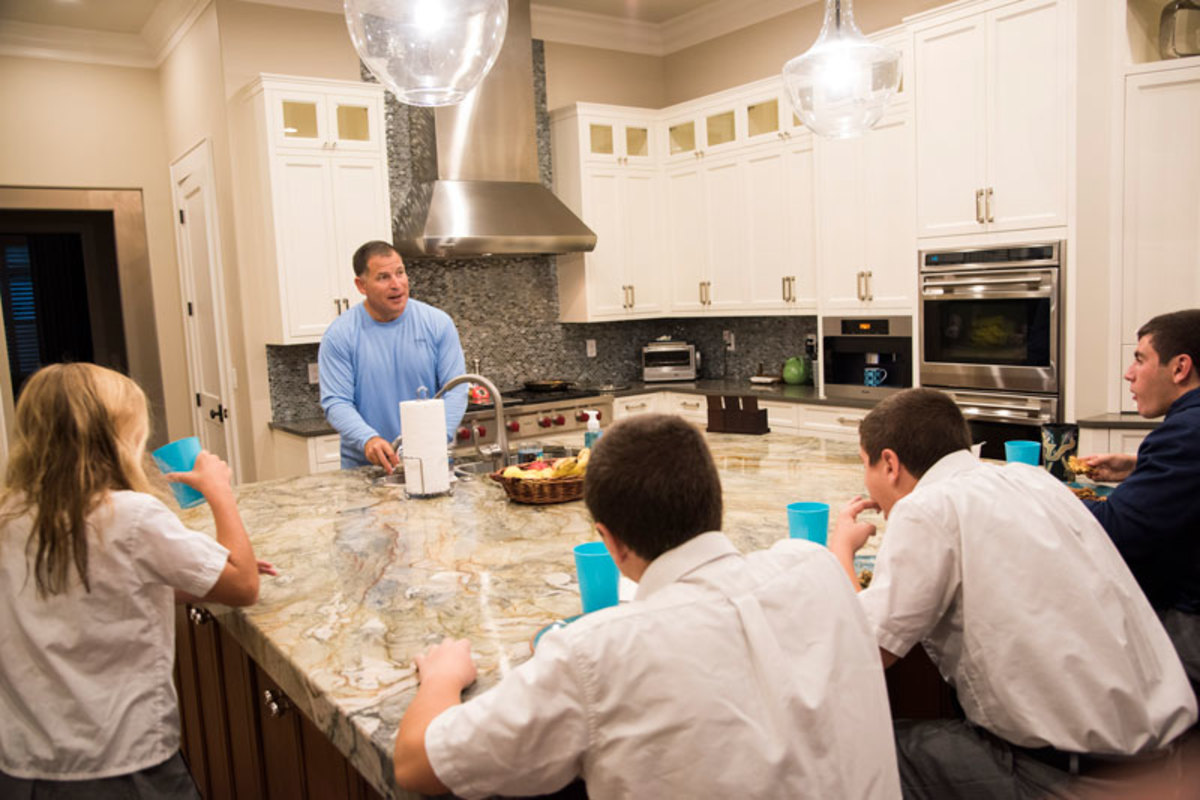
As the sun sets on a straight-from-the-Chamber-of-Commerce Friday afternoon, Greg and Christy Schiano wedge themselves into the upper corner of the metal bleachers behind the opposing sideline at Tampa Catholic. Haphazardly parked cars and metal bleacher stomps give the game against undefeated Berkeley Prep the quintessential Friday-night big-game feel.
From his perch, Schiano holds thick stationary in his left hand and a blue pen in his right. Soon after kickoff, the relentless clicking of the top of the pen tips off his anxiety. Joey Schiano is having a big season. A senior defensive end, he’s an FCS-level recruit who could end up following his dad’s footsteps and playing at Bucknell.
When two special teams miscues bury Berkeley Prep in a 14-0 hole, Greg Schiano doesn’t show any outward emotion. But he channels his nervous energy by moving from sitting to standing and back to sitting, all while increasing the frequency of his pen-clicking and note-taking. Schiano focuses on Joey, quietly pleading in a parental way for his son to reach the quarterback. Schiano doesn’t say anything strategy-related out loud, but he coaches parts of the game under his breath, saying things like “poison, poison, poison” when a punt hits the ground and Berkeley Prep players are near it.
“Everything he says is like a clinic for us coaches,” Ciao says of Schiano’s volunteering with Berkeley Prep. “It’s a pretty amazing opportunity.”
Schiano takes detailed notes on Tampa Catholic’s formations, adjustments and nuances and disappears to the locker room at halftime to gather with the defensive coaches and make a few suggestions. At one point in the second half he whistles quietly to get Joey’s attention on the sideline and mouths, “Spill the trap.” That’s a suggestion to cut under his block on a trap run play. When he returns to the game, Joey spills the trap to stuff a ball carrier for no gain. Dad nods in approval.
The Berkeley Prep coaches love having Greg Schiano around. Veteran head coach Dominick Ciao and his staff find themselves neglecting coaching at times because they’re focused on listening to Schiano. “Everything he says is like a clinic for us coaches,” says Ciao, who has won more than 180 games at the high school level. “It’s a pretty amazing opportunity.”
Schiano loves hanging around. During the year off, he’s taken the time to do things he couldn’t do before, like spend a half-hour in the coaches’ locker room after practice, trading recruiting stories. He loves how the old-school Ciao tells his players to appreciate their mom on Mother’s Day and to treat their dates right on prom night. “He’s what’s right in high school football,” Schiano says. “We’re blessed he’s coaching our kids.”
But on this night, things don’t fall well for Berkeley Prep. They claw back into the game, but a penalty negates a tying touchdown in the final minutes. Tampa Catholic scores late to seal a 28-14 win. As the final seconds tick off, Schiano hangs his pen on the neck of his dry-fit in defeat.
He looks out across the field in the chill of the October night and makes a declaration that could just as well speak to his own career crossroads. “In the end, this could really end up being good for them.”
[widget widget_name="SI Newsletter Widget”]

